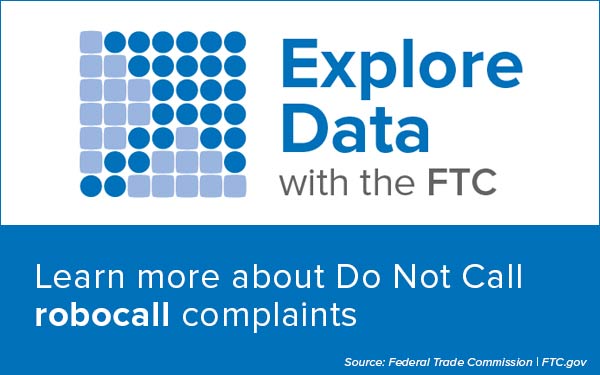Today, the Federal Trade Commission released the National Do Not Call Registry Data Book for Fiscal Year 2023, which shows that consumer complaints about robocalls and unwanted live telemarketing calls have decreased to a five-year low.
 Now in its fifteenth year of publication, the data book also provides the most recent fiscal year information available on robocall complaints, the types of calls consumers reported to the FTC, and a complete state-by-state analysis. According to the data book, complaints about imposter calls again topped the list, with more than 175,000 received during the fiscal year ending on September 30, 2023, 117,000 of which were robocalls. In such calls, imposters falsely pose as representatives of government, such as the Social Security Administration or the IRS, legitimate business entities or as people affiliated with them.
Now in its fifteenth year of publication, the data book also provides the most recent fiscal year information available on robocall complaints, the types of calls consumers reported to the FTC, and a complete state-by-state analysis. According to the data book, complaints about imposter calls again topped the list, with more than 175,000 received during the fiscal year ending on September 30, 2023, 117,000 of which were robocalls. In such calls, imposters falsely pose as representatives of government, such as the Social Security Administration or the IRS, legitimate business entities or as people affiliated with them.
FY 2023 Registration and Complaint Data
The FTC’s National Do Not Call (DNC) Registry lets consumers add their phone number and choose not to receive most legal telemarketing calls. In the last fiscal year, more than 2.6 million people signed up with the DNC Registry, bringing the total to more than 249 million actively registered phone numbers, up from 246.8 million at the end of FY 2022.
The overall number of complaints continued its decline in FY 2023, down more than 900,000 from FY 2022. The number of consumer complaints decreased for most topics, including warranties and protection plans, the second largest topic the past several years, which saw a decrease of more than 84 percent from FY 2022.
In FY 2023, the Commission received 1.2 million complaints about robocalls, down from 1.8 million in FY 2022. This is the second year in a row the number of robocalls reported has decreased. For every month in the fiscal year, robocalls—defined under FTC regulations as calls delivering a prerecorded message—made up the majority of consumer complaints about DNC violations.
Calls about medical and prescription issues comprised the second-most commonly reported topic, with consumers filing more than 142,000 complaints. Complaints about supposed debt-reduction made up the third-most commonly reported topic, followed by complaints about energy, solar, and utilities and warranties and protection plans.
Registration and Complaint Data by State
The FTC also provides a state-by-state breakdown of its data. New Hampshire continues to top the nation in active DNC registrations per capita. The top five states reporting the most DNC complaints per 100,000 people in FY 2023 were Delaware, Ohio, Virginia, Nevada and Illinois.
Operation Stop Scam Calls
In July 2023, the FTC and more than 100 federal and state law enforcement partners nationwide, including the attorneys general from all 50 states and the District of Columbia, announced “Operation Stop Scam Calls,” the largest crackdown on illegal telemarketing calls in U.S. history.
The initiative involved more than 180 actions targeting operations responsible for billions of calls to U.S. consumers, and it not only targeted telemarketers and the companies that hire them, but also lead generators who deceptively collect and provide consumers’ telephone numbers to robocallers and others, falsely representing that these consumers have consented to receive calls. The effort also targeted Voice over Internet Protocol (VoIP) service providers who facilitate illegal robocalls every year, which often originate overseas.
Underlying Data Availability
The underlying data in the report is publicly available on the FTC’s website.
Information for consumers about the DNC Registry, company-specific DNC requests, and telemarketer caller ID requirements can be found on the FTC’s website, and consumers can sign up for the DNC Registry for free. Other information about robocalls and what consumers can do about them is also available. To report unwanted telemarketing calls, consumers can file a complaint at www.donotcall.gov or call 1-888-382-1222.
The primary staffer on the report is Paul Witt in the FTC’s Bureau of Consumer Protection.
The Federal Trade Commission works to promote competition and protect and educate consumers. The FTC will never demand money, make threats, tell you to transfer money, or promise you a prize. Learn more about consumer topics at consumer.ftc.gov, or report fraud, scams, and bad business practices at ReportFraud.ftc.gov. Follow the FTC on social media, read consumer alerts and the business blog, and sign up to get the latest FTC news and alerts.
